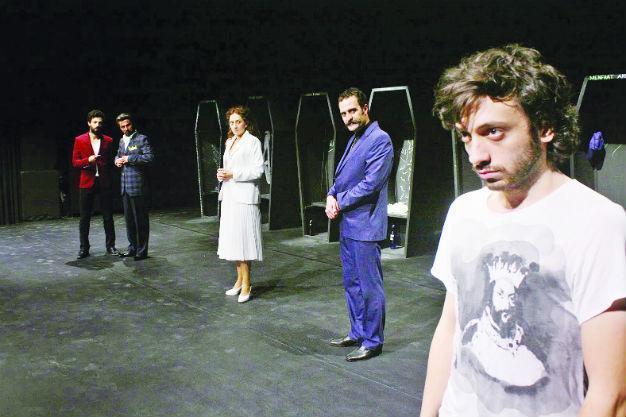Istanbul theater revamps Shakespeare plays
ISTANBUL – Anadolu Agency
 British playwright William Shakespeare’s works have undergone countless adaptations, from silent performances to dance acts, for hundreds of years. In Istanbul, a local theater adapts Shakespeare’s plays by “freely translating” and modernizing them in order to render the plays engaging and relatable to a larger audience.
British playwright William Shakespeare’s works have undergone countless adaptations, from silent performances to dance acts, for hundreds of years. In Istanbul, a local theater adapts Shakespeare’s plays by “freely translating” and modernizing them in order to render the plays engaging and relatable to a larger audience. “There are people who said to me that they were happy that they could understand a Shakespeare play. This is very precious,” Onur Ünsal, 30, says in the foyer area of the four-story theater, decorated mainly in black and white.
Ünsal, who is also a well-known television actor in Turkey, is one of the 12 founders of the Moda Sahnesi, a theater based on Istanbul’s Anatolian side, in the Kadikoy district. The group teamed up in 2013. They have since been joined by a number of other actors and actresses.
They had already performed numerous Shakespeare plays, including “Macbeth” and “Othello,” with another theater group in Istanbul.
Since 2013, they performed “Hamlet” and this year they began staging another Shakespeare classic, “A Midsummer Night’s Dream.”
What separates this theater group from the rest is the plain stage decor and ü the modern-day costumes that can consist of jeans or ordinary suits. But, more importantly, what makes the group unique is its translation of the plays’ texts into something more understandable by using modern-day language.
Moreover, most of the time in Turkey, Shakespeare plays are performed with an Istanbul accent, i.e. the “received pronunciation” of Turkish. But the Moda Sahnesi troupe uses daily Turkish and common phrases and “accepts the audience is there,” says Ünsal.
Audiences at Moda Sahnesi can hear different Turkish accents, an uncommon occurrence in Turkey. Indeed, one character can speak in a Kurdish accent, mainly used in southeast Turkey, or with an accent from Thrace where “H” sound is not pronounced.
Some academics have criticized the group for their use of accents, says Ünsal.
“We do not believe that Turkish should be spoken well or that an Istanbul accent should be spoken [in plays],” he says. “If we are working in the theater business in this country, every accent, or everyone, should be involved.”
One of the reasons for such an adaptation is to make people feel the story “locally,” Ünsal says.
“To explain that this is a story that also belongs to this land,” he says: “It is not only a story based on that era’s England, this is a story which has been relevant for the last 400 years.”
Impact of terror attacks
Since 2013, around 70,000 people have seen the troupe’s performances annually. Tickets have a tendency to sell out one or two months ahead, says Ünsal. Lately, the recent deadly terror attacks in the city have dampened audiences’ enthusiasm for the theater.
Referring to the March 19 suicide attack on Istanbul’s teeming İstiklal Avenue, Ünsal says: “That day more than half of our audience did not show up. The ones who could make it here were probably the ones who lived close by and did not need to use public transportation.”
A cultural center hosting concerts and film screenings
Moda Sahnesi largely functions as a cultural center. It also hosts concerts, dance and stand-up shows and boasts a cinema.
It was founded with a budget of around 2 million Turkish Liras, Ünsal says.
“Most of this amount, around 90 percent, was loans from banks, and has almost been paid back,” he adds.
The theater features 10 plays at a time, two of which are intended for children.
In general, Istanbul’s cultural events take place on the European side. But, according to Ünsal, there are around 40 private theaters on the Anatolian side; they united under an umbrella organization called Kadıköy Theater Platform to support community theaters.
As March 27 marks World Theater Day, members of Moda Sahnesi as well as 37 other theaters based in Kadıköy will march on the district’s main street.
Istanbul theater-lovers enjoy a wide range of choices as the city also hosts state- and city-supported theaters. But private theaters must sell their tickets at much higher prices, due to state taxes, often leaving them with little profit.
“We [private theaters] have to pay a tax between 39-49 percent,” Ünsal says.
“If state theaters can sell their tickets for 5-10 liras, there is a reason behind this, they have state support,” Ünsal adds. “We sell our tickets for 45-50 liras and cannot make so much as a 10 lira profit. We are an institution that gives one third of [our profit] to the state,” he adds. Despite economic difficulties, Moda Sahnesi will continue to perform other Shakespeare plays but Ünsal does not want to name them before talking with his colleagues. “We want to complete the entirety of his works here,” he says.
















